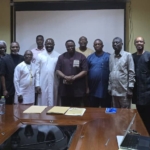
Christian leaders across the country have come together in a landmark meeting to rally support for national prayer, unity, and effective governance, as Ghana navigates pressing social and economic challenges.
The gathering, convened by the Presidential Envoy for Interfaith and Ecumenical Relations, Elvis Afriyie Ankrah, took place at the Accra International Conference Centre (AICC).
It drew senior representatives from Ghana’s leading Christian councils and associations, including the Christian Council of Ghana, the Ghana Pentecostal and Charismatic Council (GPCC), the Catholic Bishops’ Conference, the National Association of Charismatic and Christian Churches (NACCC), the Council for Independent Churches, the Prophetic Empowerment Network, and the Seventh-day Adventist Church, among others.
Addressing the participants, Mr Afriyie Ankrah praised the unwavering commitment of the Christian community, describing it as a vital force in preserving the nation’s peace, unity, and moral values. “The strength of Ghana lies not only in the prayers of its people but also in the competence of its governance structures. The Christian community has a unique and irreplaceable role in safeguarding our national fabric,” he affirmed.
The leaders deliberated on the theme of National Responsibility and Prayer, highlighting that the government’s duty to deliver on unemployment, security, and governance must go hand in hand with the church’s spiritual responsibility to pray and intercede for the nation. They stressed that prayer should not be confined to special events or emergency interventions, but must become a sustained practice across all churches.
Participants also underscored the need for a balance between prayer and professional competence in governance. They argued that while faith is a powerful foundation for national progress, it must complement—not replace—effective leadership, accountability, and transparency. Regular updates to the public and clear communication in times of crisis, they agreed, are crucial for building and maintaining trust.
In a frank assessment, the leaders acknowledged that divisions within the Christian fraternity have often weakened the collective voice of the church in national matters. To address this, they called for the establishment of an Apex Christian Body to provide unified leadership, coordinate national-level engagement, and present a coherent Christian perspective on issues of governance, peace, and development.
The meeting concluded with a strong commitment to deepening collaboration among Christian organisations and intensifying national prayer initiatives. The leaders pledged to work hand in hand with government, civil society, and other faith groups to promote unity and provide both moral and spiritual direction for the nation at a time of growing economic and social pressures.
For many of the participants, the gathering marked a turning point in how the Christian community positions itself in national affairs—moving beyond fragmented voices and sporadic events towards a more unified, structured, and consistent contribution to Ghana’s stability and progress